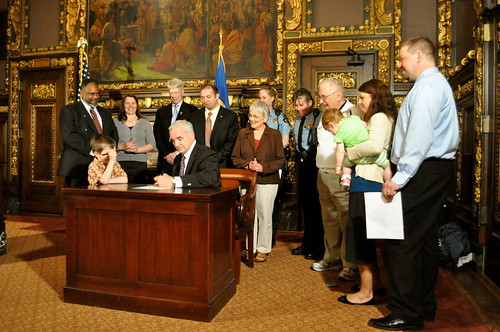 A recent article, “For gay couples, divorce comes with extra costs”
describes the difficulties some people have faced in getting a same-sex divorce. Some of the difficulties identified have been addressed in Minnesota’s recent same-sex civil marriage legislation and others are not unique to same-sex couples. Here are the problems identified in that article and my thoughts.
Problem: Courts haven’t figured out how to handle these new same-sex marriage divorce cases. The recent legislation in Minnesota addresses this issue by making it clear that all existing laws dealing with “marriage” now apply to the new same-sex marriages. This includes all laws concerning divorce which have been in effect for decades. The courts in Minnesota will apply the same divorce rules and procedures for divorcing same-sex marriages.
Problem: Location, location, location. Many couples travelled to a state recognizing same-sex marriages in order to be married but now reside elsewhere, in a state where same-sex marriages are not legal. States that don’t recognize same-sex marriages won’t grant a divorce to a couple whose marriage is viewed as unlawful. Can the couple return to the state where they married to get divorced? Most states have a residency requirement, typically residing for six months in that state, before a divorce proceeding may be initiated in that state.
The Minnesota legislation addresses this problem. It allows a divorce action in Minnesota even if neither party resides in Minnesota if the civil marriage was performed in Minnesota and neither party resides in a state which recognizes same-sex marriage and allows divorce actions for such marriages. So, if a same-sex couple married in Minnesota and later moved to Wisconsin where same-sex marriages are not legal, they can be divorced in Minnesota.
Problem: Time together: Reality vs. legality. Many same-sex couples lived together for years before being able to legally marry. During the years or decades before marriage, they acquired assets, bought homes together, shared expenses, acquired debt, and commingled their finances. Yet, under traditional divorce law, it is only assets and debts acquired during the marriage that are considered.
This is also a problem for straight couples who live together for years before marrying or who never marry. When their relationships end and they need to divide their assets and debts, divorce laws don’t help them. Unless they entered into a prenuptial agreement addressing how these assets and debts acquired before the marriage would be divided, or if never married – a contract addressing these issues, they would have a difficult time finding an efficient legal remedy for their situation. Litigating these issues in court will be expensive.
These issues can be addressed in the collaborative process, which is not limited to divorces, and where people with unique problems and issues not adequately addressed in traditional law forums can reach agreements. Once agreements have been reached, these agreements can be filed with the court and made into enforceable court orders.
A recent article, “For gay couples, divorce comes with extra costs”
describes the difficulties some people have faced in getting a same-sex divorce. Some of the difficulties identified have been addressed in Minnesota’s recent same-sex civil marriage legislation and others are not unique to same-sex couples. Here are the problems identified in that article and my thoughts.
Problem: Courts haven’t figured out how to handle these new same-sex marriage divorce cases. The recent legislation in Minnesota addresses this issue by making it clear that all existing laws dealing with “marriage” now apply to the new same-sex marriages. This includes all laws concerning divorce which have been in effect for decades. The courts in Minnesota will apply the same divorce rules and procedures for divorcing same-sex marriages.
Problem: Location, location, location. Many couples travelled to a state recognizing same-sex marriages in order to be married but now reside elsewhere, in a state where same-sex marriages are not legal. States that don’t recognize same-sex marriages won’t grant a divorce to a couple whose marriage is viewed as unlawful. Can the couple return to the state where they married to get divorced? Most states have a residency requirement, typically residing for six months in that state, before a divorce proceeding may be initiated in that state.
The Minnesota legislation addresses this problem. It allows a divorce action in Minnesota even if neither party resides in Minnesota if the civil marriage was performed in Minnesota and neither party resides in a state which recognizes same-sex marriage and allows divorce actions for such marriages. So, if a same-sex couple married in Minnesota and later moved to Wisconsin where same-sex marriages are not legal, they can be divorced in Minnesota.
Problem: Time together: Reality vs. legality. Many same-sex couples lived together for years before being able to legally marry. During the years or decades before marriage, they acquired assets, bought homes together, shared expenses, acquired debt, and commingled their finances. Yet, under traditional divorce law, it is only assets and debts acquired during the marriage that are considered.
This is also a problem for straight couples who live together for years before marrying or who never marry. When their relationships end and they need to divide their assets and debts, divorce laws don’t help them. Unless they entered into a prenuptial agreement addressing how these assets and debts acquired before the marriage would be divided, or if never married – a contract addressing these issues, they would have a difficult time finding an efficient legal remedy for their situation. Litigating these issues in court will be expensive.
These issues can be addressed in the collaborative process, which is not limited to divorces, and where people with unique problems and issues not adequately addressed in traditional law forums can reach agreements. Once agreements have been reached, these agreements can be filed with the court and made into enforceable court orders.  A recent article, “For gay couples, divorce comes with extra costs”
describes the difficulties some people have faced in getting a same-sex divorce. Some of the difficulties identified have been addressed in Minnesota’s recent same-sex civil marriage legislation and others are not unique to same-sex couples. Here are the problems identified in that article and my thoughts.
Problem: Courts haven’t figured out how to handle these new same-sex marriage divorce cases. The recent legislation in Minnesota addresses this issue by making it clear that all existing laws dealing with “marriage” now apply to the new same-sex marriages. This includes all laws concerning divorce which have been in effect for decades. The courts in Minnesota will apply the same divorce rules and procedures for divorcing same-sex marriages.
Problem: Location, location, location. Many couples travelled to a state recognizing same-sex marriages in order to be married but now reside elsewhere, in a state where same-sex marriages are not legal. States that don’t recognize same-sex marriages won’t grant a divorce to a couple whose marriage is viewed as unlawful. Can the couple return to the state where they married to get divorced? Most states have a residency requirement, typically residing for six months in that state, before a divorce proceeding may be initiated in that state.
The Minnesota legislation addresses this problem. It allows a divorce action in Minnesota even if neither party resides in Minnesota if the civil marriage was performed in Minnesota and neither party resides in a state which recognizes same-sex marriage and allows divorce actions for such marriages. So, if a same-sex couple married in Minnesota and later moved to Wisconsin where same-sex marriages are not legal, they can be divorced in Minnesota.
Problem: Time together: Reality vs. legality. Many same-sex couples lived together for years before being able to legally marry. During the years or decades before marriage, they acquired assets, bought homes together, shared expenses, acquired debt, and commingled their finances. Yet, under traditional divorce law, it is only assets and debts acquired during the marriage that are considered.
This is also a problem for straight couples who live together for years before marrying or who never marry. When their relationships end and they need to divide their assets and debts, divorce laws don’t help them. Unless they entered into a prenuptial agreement addressing how these assets and debts acquired before the marriage would be divided, or if never married – a contract addressing these issues, they would have a difficult time finding an efficient legal remedy for their situation. Litigating these issues in court will be expensive.
These issues can be addressed in the collaborative process, which is not limited to divorces, and where people with unique problems and issues not adequately addressed in traditional law forums can reach agreements. Once agreements have been reached, these agreements can be filed with the court and made into enforceable court orders.
A recent article, “For gay couples, divorce comes with extra costs”
describes the difficulties some people have faced in getting a same-sex divorce. Some of the difficulties identified have been addressed in Minnesota’s recent same-sex civil marriage legislation and others are not unique to same-sex couples. Here are the problems identified in that article and my thoughts.
Problem: Courts haven’t figured out how to handle these new same-sex marriage divorce cases. The recent legislation in Minnesota addresses this issue by making it clear that all existing laws dealing with “marriage” now apply to the new same-sex marriages. This includes all laws concerning divorce which have been in effect for decades. The courts in Minnesota will apply the same divorce rules and procedures for divorcing same-sex marriages.
Problem: Location, location, location. Many couples travelled to a state recognizing same-sex marriages in order to be married but now reside elsewhere, in a state where same-sex marriages are not legal. States that don’t recognize same-sex marriages won’t grant a divorce to a couple whose marriage is viewed as unlawful. Can the couple return to the state where they married to get divorced? Most states have a residency requirement, typically residing for six months in that state, before a divorce proceeding may be initiated in that state.
The Minnesota legislation addresses this problem. It allows a divorce action in Minnesota even if neither party resides in Minnesota if the civil marriage was performed in Minnesota and neither party resides in a state which recognizes same-sex marriage and allows divorce actions for such marriages. So, if a same-sex couple married in Minnesota and later moved to Wisconsin where same-sex marriages are not legal, they can be divorced in Minnesota.
Problem: Time together: Reality vs. legality. Many same-sex couples lived together for years before being able to legally marry. During the years or decades before marriage, they acquired assets, bought homes together, shared expenses, acquired debt, and commingled their finances. Yet, under traditional divorce law, it is only assets and debts acquired during the marriage that are considered.
This is also a problem for straight couples who live together for years before marrying or who never marry. When their relationships end and they need to divide their assets and debts, divorce laws don’t help them. Unless they entered into a prenuptial agreement addressing how these assets and debts acquired before the marriage would be divided, or if never married – a contract addressing these issues, they would have a difficult time finding an efficient legal remedy for their situation. Litigating these issues in court will be expensive.
These issues can be addressed in the collaborative process, which is not limited to divorces, and where people with unique problems and issues not adequately addressed in traditional law forums can reach agreements. Once agreements have been reached, these agreements can be filed with the court and made into enforceable court orders. 

